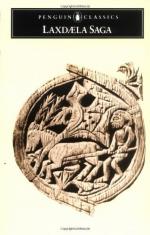The ’Laxdale Saga’—one of the great Sagas of Iceland—is herewith introduced for the first time to English readers. The translation has been made by Mrs. Muriel Press. The original text presents many difficulties, and the manuscript translation has had the advantage of being revised by a competent Icelander. Many doubtful passages have been elucidated by him. The accompanying Note gives his interpretation of the obscure verses on page 234. In addition to these kind services, he has specially prepared for this volume the Map of the Places mentioned in the Saga. It is to be hoped that Mrs. Press’s efforts to popularise this famous Saga may be successful, and may warrant the publication of other Sagas, and Masterpieces of Northern literature, in the Series, notably ‘Njala-Saga,’ ‘Volsunga-Saga,’ and the ‘Eddas.’
I.G.
October 13, 1899,
* * * * *
NOTE
These lines may be thus interpreted:—
“Hangs a wet hood on
the wall;
It knoweth of a trick;
Though it be at most times
‘dry,’
I hide not now it knoweth
two.”
The ditty points to the fact that Snorri had given Audgisl Thorarinson a “chased axe” (one trick), and that, at Snorri’s secret behest, Audgisl was now on the eve of taking the hood-owner’s (Thorgils Hallason’s) life (two). This, the hood says, it knows, though at most times it is ‘dry.’ ‘Dry’ here seems clearly to stand in the sense of ‘clear of,’ ‘free from,’ expers, immunis; practically, ignorant. At most times the hood is ignorant of such ‘tricks’ threatening Thorgils’ life, though now it knows of one, even two. With this use of ‘ethurr,’ cf. Sturlunga^2 ii. 227_{37}—“Um sum illvirki þeirra er þat sumum moennum eigi tvimaelis-laust, hvart þer munieth þurt hafa um setieth allar vitundir” = “As to some misdeeds of theirs, it is to some men (a matter) not free from double speech whether you will have sat (by) ‘dry’ of all knowledge (i.e. complicity) therein,” i.e., concerning certain of their misdeeds some persons will have their doubts as to whether you be ‘clear of’ all complicity therein.
Of course it is Thorgils’ ‘Fylgja’ (Fetch) that speaks through the cloak.



